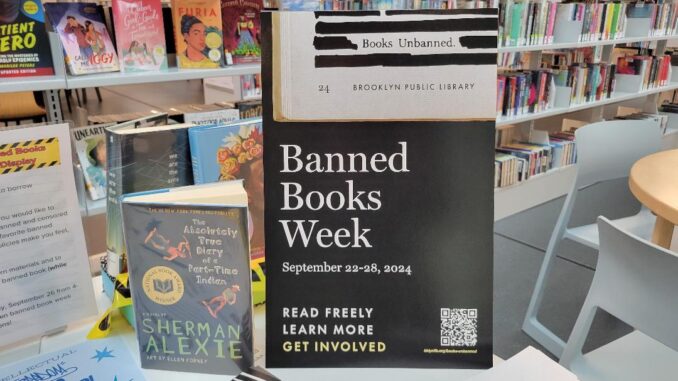
BY IAN M. TORRES
Kelly M. Coffey, a teen-focused librarian and creative coach within the New York Public Library system is just one of many celebrating Banned Books Week, as a productive way to raise censorship awareness.
September 22-28, 2024 marks the 42nd year of the week-long event known to book lovers and readers as a celebratory occasion. Banned Books Week was first launched in 1982 and established in response to a growing number of challenges to books in libraries, bookstores and schools.
According to the American Library Association, 414 attempts to censor library materials and services were made between January 1 and August 31, 2024. In those cases, 1,128 unique titles were challenged.
In the same period last year, ALA tracked 695 attempts with 1,915 unique titles challenged. Though the 2024 number has declined from the comparable period in 2023, the number of documented attempts to censor books continues to far exceed the numbers prior to 2020.
Most Americans don’t agree with book banning. A survey also done by the ALA found that 71% of voters and parents oppose the removal of books from public libraries. “It’s incredibly important for us to preserve our rights as Americans and preserve our right to free speech, free imagination and free information,” Coffey said.
Usually held during the last week of September, this week-long event is celebrated to draw national attention to the harms of censorship and celebrates the freedom to read banned and challenged books across the nation.
Highlighting the value of free and open access to information, it brings together a community of book lovers and readers, from librarians, educators and booksellers, to authors and publishers alike.
“It’s an important initiative, not just for libraries and publishers but for news outlets, anyone in media, journalism, public service, including social services. It’s obviously imperative that we keep information accessible for students’ educational purposes, and professional development,” Coffey said.
“Banned Books is not just about non-fiction. It’s also just about embracing creativity, infinite creativity. I think as an American specifically,” she added.
With books still being challenged and banned today, the theme for this year’s campaign is “Freed Between the Lines,” suggesting a counter challenge as a powerful statement against book banning. Attempts to remove or restrict materials, based on the objections of a person or group citing such issues as racism or sexuality, have been the focus of the campaign.
The American Library Association, the oldest library organization in the world, hosts a number of events throughout Banned Books Week, releasing a strong statement of support for the event. It reads in part,
The freedom to read is essential to our democracy. It is continuously under attack.
Private groups and public authorities in various parts of the country are working to remove or limit access to reading materials, to censor content in schools, to label “controversial” views, to distribute lists of “objectionable” books or authors, and to purge libraries. These actions apparently rise from a view that our national tradition of free expression is no longer valid; that censorship and suppression are needed to counter threats to safety or national security, as well as to avoid the subversion of politics and the corruption of morals. We, as individuals devoted to reading and as librarians and publishers responsible for disseminating ideas, wish to assert the public interest in the preservation of the freedom to read.
